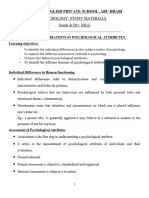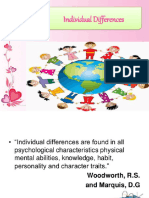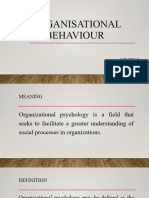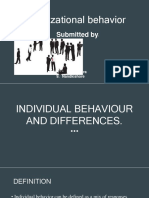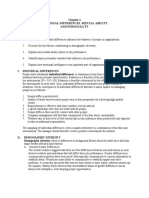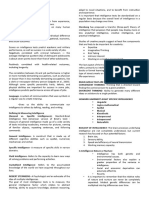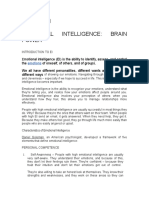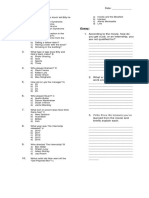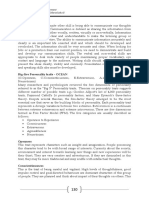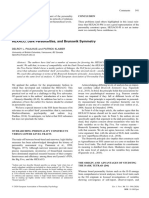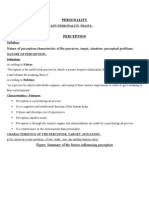Human Behavior Management
Chapter 2
INDIVIDUAL DIFFERENCES, MENTAL ABILITY, AND PERSONALITY
INDIVIDUAL DIFFERENCES
Individual differences refer to the variation in how people respond to the same situation based on
personal characteristics.
Consequences of Individual Differences
1. Individual differ in productivity
2. People differ in the quality of their work
3. People react differently to empowerment
4. People react differently to any style of leadership
5. People differ in terms of need for contact with other people
6. People differ in terms of commitment to the organization
7. People differ in terms of level of self-esteem
WHAT MAKES PEOPLE DIFFERENT FROM EACH OTHER
A. Demographic Diversity
1. Gender Differences
The differences in the perception of male and female roles are referred to as gender differences.
Specifically, men and women are not different along the following concerns:
1. Problem solving abilities
2. Analytical skills
3. Competitive drive
4. Motivation
5. Learning ability
6. Sociability
2. Generational and Age-Based Differences
A worker that belongs to a certain generation may behave differently from a worker who belongs
to another. (Generational Differences)
Differences in the ages of workers also bring about expectations of differences in the behavior or
workers.
3. Culture
Differences in job performance and behavior are sometimes caused by differences in culture.
� B. Aptitude and Ability
Aptitude may be defined as the capacity of a person to learn or acquire skills.
Ability refers to an individual’s capacity to perform the various tasks in a job.
Physical ability refers to the capacity of the individual to do tasks demanding stamina, dexterity,
strength, and similar characteristics.
Dimensions of Intellectual Ability
Cognitive intelligence
It refers to the capacity of a person to acquire and apply knowledge including solving problems.
Social intelligence
It refers to a person’s ability to relate effectively with others.
Emotional intelligence
It refers to a person’s qualities such as understanding one’s own feelings, empathy for others,
and the regulation of emotion to enhance living.
Cultural intelligence
It refers to an outsider’s ability to interpret someone’s unfamiliar and ambiguous behavior the
same way that person’s compatriot would.
The Triarchic Theory of Intelligence
Componential Intelligence
It is also referred to as analytical intelligence, it involves components (or mental processes) used
in thinking
Experiential intelligence
It is also referred to as creative intelligence, is that type of intelligence that focuses on how
people perform on tasks with which they have either little or no previous experience or else great experience.
Contextual intelligence
It is also known as practical intelligence, is a type of everyday intelligence or street smarts.
Multiple Intelligences
Linguistic
People who possess this component of intelligence is sensitive to language, meanings, and the
relations among words.
Logical-Mathematical
This component covers abstract thought, precision, counting, organization, and logical structure,
enabling the individual to see relationship between objects and solve problems.
� Musical
This gives people the capacity to create and understand meanings made out of sounds and to
enjoy different types of music.
Spatial
It enables people to perceive and manipulate images in their brain and to recreate them from
memory, such as making graphic designs.
Bodily-kinesthetic
This enables the people to use their body and perceptual and motor systems in skilled ways.
Intrapersonal
The person with this kind of intelligence has highly accurate understanding of himself or herself.
Interpersonal
This makes it possible for persons to recognize and make distinctions among the feelings,
motives, and intentions of others, as in managing people and parenting children.
Naturalist
A person with this intelligence possesses the ability to seek patterns in the external physical
environment.
PERSONALITY
Personality refers to the sum total of ways in which an individual reacts and interacts with others.
Determinants of Personality
The personality of an individual is a result of both hereditary and environmental factors.
Heredity Factors:
Physical stature
Facial attractiveness
Gender
Temperament
Muscle composition and reflexes
Energy level
Biological rhythms
Environmental Factors:
Cultural factor
It refers to the established norms, attitudes, and values that are passed along from one generation
to the next and creates consistency over time.
Social factor
It refers to those that reflect family life, religion and the many kinds of formal and informal
groups in which the individual participate throughout his life.
Situational factor
It indicates that the individual will behave differently in different situations.
� Personality Factors and Traits
Emotional stability Conscientiousness
Emotionally stable person Highly conscientious person
Emotionally unstable person Person with low score on conscientiousness
Extraversion Self-monitoring behavior
Extravert High self-monitor
Introvert Low self-monitor
Openness to experience Risk taking and thrill seeking
Open minded person Risk taker
Close minded person Play safe person
Agreeableness Optimism
Agreeable person Optimist
Disagreeable person Pessimist
EMOTIONAL INTELLIGENCE
Emotional Quotient (EQ) refers to the ability of the person to accurately perceive, evaluate, express and
regulate emotions and feelings.
Five (5) Components of EQ:
1. Self-regulation
This refers to the ability to calm down anxiety, control impulsiveness, and react appropriately to
anger.
2. Motivation
This refers to the passion to work for reasons that go beyond money or status.
3. Empathy
This refers to the ability to respond to the unspoken feelings of others.
4. Self-awareness
This refers to the awareness of one’s own personality or individuality.
5. Social skills
This refers to the proficiency to manage relationships and building networks.
MORE ON PHYSICAL ABILITY
1. Sense of sight
2. Sense of hearing
3. Sense of taste
4. Sense of smell
5. Sense of touch














